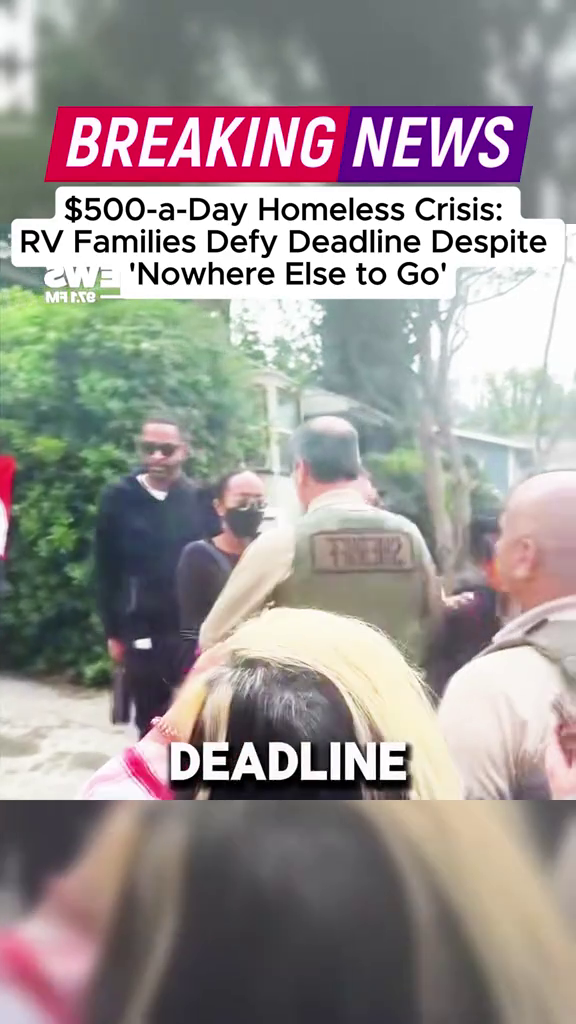The widening gap in affordable housing across the United States has given rise to a visible and heartbreaking consequence: the growth of vehicular homelessness. Nowhere is this struggle more acutely felt than in Clark County, Nevada, where a recent confrontation between authorities and families living in a makeshift RV park has brought the issue into sharp focus. The incident involves dozens of unsheltered residents, including families, who have defied an eviction deadline, driven by the desperate reality that they have “nowhere else to go.” Their defiance is met with a staggering threat: a fine of $500 a day for remaining on the property.
🚨 A Deadline and a Daily Fine
The tensions center on an undeveloped lot, reportedly across the street from the M Resort, which has become a temporary, unregulated home for people living out of their recreational vehicles (RVs) and trailers. For many, these vehicles represent the last barrier between a semblance of privacy and the total vulnerability of street homelessness. The land, which is private property, has drawn the attention of Clark County officials and the Sheriff’s department, who, alongside the property owner, issued a formal notice to vacate.
The severity of the situation is underscored by the punitive measure attached to the deadline. Residents who do not clear out their vehicles and belongings face a penalty that is crushing for people already struggling to make ends meet: a $500 per day fine. This immense financial pressure is designed to force immediate compliance, yet, for the occupants of the RV park, it only amplifies their already dire circumstances. The video footage captured at the site shows confrontations between uniformed officials and distraught residents, highlighting the difficult, high-stakes nature of the enforcement actions.
“It is wrong, I understand what they’re saying is wrong, but on the other hand, it’s wrong just to throw us out somewhere else,” stated one resident in the video, capturing the core ethical dilemma of the situation. The enforcement of property rights clashes directly with the human right to shelter and safety.
🤝 Building a ‘Family’ in the Shadows
The makeshift RV park is more than just a collection of parked vehicles; it has evolved into a fragile, self-sustaining community. Residents, many of whom are families, elderly individuals, or people with disabilities, rely on one another for support, security, and a shared sense of belonging. They refer to their encampment as a “family,” a term that speaks volumes about the emotional and logistical support system they have built in the absence of institutional aid.
This communal bond is a common feature of established encampments. When traditional social structures and safety nets fail, individuals band together for mutual survival. The video shows images of children’s items, makeshift fences, and collected belongings, painting a picture of lives trying to achieve normalcy in an abnormal environment. The decision to defy the eviction is less an act of political rebellion and more an act of self-preservation, rooted in the collective understanding that dispersal means isolation and increased danger.
One resident emotionally spoke about the reality of their life, saying, “I just don’t like seeing somebody hungry, you know.” This simple, powerful statement cuts to the heart of the matter—the basic, unmet need for food and safety that defines their day-to-day existence and that their community structure attempts to fulfill.
🏠 The Affordable Housing Crisis: A Root Cause
The Clark County RV crisis is a stark symptom of a much larger, systemic problem: the national affordable housing crisis. In rapidly growing areas like Las Vegas and surrounding Clark County, rising rents, stagnant wages, and a scarcity of low-income housing units push increasing numbers of people to the brink. When permanent housing becomes financially unattainable, people turn to unconventional solutions. For those with a vehicle, an RV or trailer offers a slightly more stable, though illegal, housing option than sleeping on a sidewalk.
- Renting Costs: The average rental price in many desirable urban and suburban areas has soared, putting even entry-level apartments out of reach for minimum-wage earners.
- Low Barrier to Entry: Acquiring an older RV or trailer can sometimes be cheaper than securing a security deposit and first month’s rent for a conventional apartment.
- Zoning Restrictions: Strict zoning laws often prevent the establishment of legal, sanctioned low-cost housing or temporary safe parking zones, forcing RV residents onto private or undeveloped public land.
The lack of safe, designated parking spaces or temporary shelter solutions for people in vehicles forces them into a cycle of illegal parking, eviction, and relocation, often compounded by fines and vehicle impoundment. For the families in Clark County, their resistance is a direct result of the failure of the housing market to provide a viable alternative.
⚖️ Navigating the Legal and Ethical Tangle
The situation presents a complex legal and ethical challenge for Clark County officials. The property owner has a clear legal right to secure their land and remove trespassers. Furthermore, the presence of large encampments raises valid concerns about public health, sanitation, and safety. The video mentions officials citing the “Nature of Nuisance” in their written orders, which often includes the accumulation of solid waste, debris, and general unsanitary conditions.
However, a purely enforcement-based approach fails to address the underlying human crisis. Simply moving the residents is not a solution; it merely shifts the problem to another location. Advocates for the unsheltered community argue that issuing crippling fines to people with no income is not only counterproductive but inhumane. They urge county officials to prioritize “Housing First” solutions, which focus on providing permanent, stable housing without preconditions like sobriety or employment.
The Need for Comprehensive Solutions
- Designated Safe Parking: Establishing legally sanctioned safe parking zones with basic services (sanitation, trash disposal) could immediately address the safety and hygiene concerns associated with unregulated encampments while offering stability to residents.
- Rapid Re-Housing Programs: Dedicated funding for rapid re-housing initiatives to quickly move families from vehicles into permanent rental units, coupled with short-term rental assistance.
- Affordable RV Parks: Incentivizing or developing low-cost RV parks that operate under legal guidelines, providing a transition point for those whose only home is their vehicle.
- Mental Health and Addiction Services: Deploying outreach teams to offer voluntary connections to vital services, including mental health care and programs for addiction recovery, instead of relying on law enforcement for every interaction.
The families in Clark County have made their position clear: they will not leave until they are “forced out” because the alternative is unacceptable. Their plight serves as a demanding message to local and state governments: enforcement alone will never solve a crisis rooted in the lack of safe, affordable shelter. As the deadline passes and the threat of daily fines looms, the world watches to see if Clark County will respond with compassion and comprehensive solutions, or if the families will be kll-ed by the crisis of displacement.

